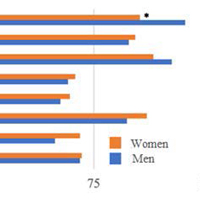The Russian scientists’ quality of life and cognitive status

Accepted: 7 April 2021
HTML: 9
All claims expressed in this article are solely those of the authors and do not necessarily represent those of their affiliated organizations, or those of the publisher, the editors and the reviewers. Any product that may be evaluated in this article or claim that may be made by its manufacturer is not guaranteed or endorsed by the publisher.
Authors
Aim of the study was assessment of executive functions and quality of life (QoL) among scientists aged 22-80 years working in state research centers. The screening test included several questionnairs: “Cognitive screening”, “Age is not a barrier”, “Geriatric Depression Scale" (GDS) and Social Functioning 36 (SF-36) survey. According to the assessment, the group of scientists showed problems related to physical health disorders and presence of numerous risk factors for professional efficiency decline. High rate of preasthenia (39.62%) and asthenia syndrome (11.32%) was identified. This might be due to high level of stress and informational load that causes depletion of functional organism reserves. The rate of cognitive executive functions decline was low (3.77%), stated in young age and possibly associated with depression and asthenia. In comparison to general population, Russian scientists showed a generally high level of quality of life (more than 70% in all domains), best indicators on the scales of "Body Pain" and "Vitality", but lower indicators of "Role functioning” due to the emotional state. In general, scientists’ quality of life decreased with age, especially "Physical Functioning" and "Body Pain" scales. Social skills such as "Role functioning due to emotional state" increased with age. In the scientists group, connection between cognitive functions and the quality of life was observed. Specifically, between "Physical Functioning", "General Health", "Vitality", "Social Functioning" and "Mental Health".
How to Cite
PAGEPress has chosen to apply the Creative Commons Attribution NonCommercial 4.0 International License (CC BY-NC 4.0) to all manuscripts to be published.

 https://doi.org/10.4081/ejtm.2021.9744
https://doi.org/10.4081/ejtm.2021.9744



